Although they are basically unknown outside of the Midwest, Me & Dem Guys were one of the most popular and successful regional bands to emerge from Southwest Michigan. Despite being an impressive live act featuring outstanding instrumentation, impressive group vocals and a batch of excellent recordings, the band was never able to breakout to national success during the eight years they were together. Although they are most closely associated with Grand Rapids, the roots of the band began a little over 100 miles away to the southeast in the smaller city of Jackson, Michigan
During the 1960’s, Jackson was not exactly a hotbed of rock and roll. The city was the birthplace of the Republican Party, and it was readily identifiable to most Michiganders as the home of the Southern Michigan Prison, which was at that time, the largest walled prison and one of the largest maximum security facilities in the world.
But even in this seemingly barren cultural landscape, rock and roll bands had managed to sprout in some of Jackson’s high schools, emboldened to a certain extent by the popular AM radio deejays of the day. The jocks were the ones responsible for pumping rock and roll into the transistors favored by area teens, and also onto the car radios of those lucky enough to have their own set of wheels, or at least access to the family car for cruising through the drive-ins on the weekends.
These young bands were inspired by popular artists of the day such as Del Shannon, the Beach Boys, the Ventures, and early Motown. Composed primarily of young men, the main attractions were the twin thrills of playing rock and roll on stage, and attracting the attention of girls who otherwise might not have given them a second look.
One of the prime movers in this nascent Jackson music scene was popular radio personality John Hopkins. A 1948 graduate of Jackson High, Hopkins did remote broadcasts as "Jolly Prince John" for WKHM-AM from Hopkin's Radio & Music, his family's business located on Michigan Avenue, the city's main drag. Spinning all the latest hits for the area teens who were "cattin' the Ave", the store's parking lot became not only a popular hang-out, but also the scene of impromptu street dances.
Besides hosting his own Top 40 program, Hopkins was in demand on the weekends as a deejay for the record hops at local high schools. As a result of this profitable sideline, Hopkins came in contact with the Biscaynes and the Teentones, two Jackson high school bands that he began to manage in 1962.
Three future members of Me & Dem Guys came from these two high school bands; Frank Eimer and “Daddy” Max Calhoun from the Biscaynes and Bobby Stiles from the Teentones. Of the two bands, the Teentones were more successful, especially after John Hopkins moved Frank Eimer into the band in 1963 in order to bolster the sound with his vocals and guitar playing. As a result of the switch, the band name was changed slightly to Frankie and the Teentones. Something of a child prodigy, Eimer had started playing piano at the age of three, and he was singing by the age of seven. Frank picked up the guitar at thirteen, and after playing in both the Biscaynes and the Teentones would go on to major in music after graduating from high school.
While in his first year at Jackson Junior College, Eimer recruited sax player John Jennings into the line-up. Jennings had also started piano at an early age and then picked up the sax when he was thirteen. Eimer and Jennings had first met in a music course at college, and discovered that they shared a mutual interest in rock and roll.
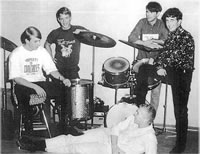 Frankie and The Teentones
Frankie and The Teentones
Manager John Hopkins then arranged for Frankie and the Teentones to record three tracks on the small Dearborn Records label, located near Detroit. The band recorded “Sands Of Arabia”, “Roses And Satin”, and “Told You Little Baby” at the session. None of these songs came close to becoming a hit, however. Hopkins felt that the ages of some of the band members were part of the problem. Since most of Frankie & The Teentones were still in high school, it hindered the band’s ability to perform outside of Jackson.
To take advantage of the opportunities to play nightclubs and college campuses, Hopkins recruited older musicians to join core members Eimer, Jennings and bassist Bobby Stiles. Rhythm guitarist “Daddy” Max Calhoun was brought in from the Biscaynes along with two of John Jennings' friends; keyboardist Jan Porter and drummer Lynn Riggs.
With this older line-up, the name Teentones no longer seemed apropos. The band’s unusual new moniker, however, came about by accident at their first gig at Jackson Community College in 1964. They were about to play at one of the school’s mixers when someone asked Jennings who was in the group. John pointed to rest of the members and replied “Well, it’s me and dem guys!” The crazy name stuck, and the band would use it for the rest of its professional life.
The immense popularity of the Beatles in 1964 along with other English groups such as the Animals, the Searchers, the Rolling Stones, and the Dave Clark Five served to put a new emphasis on rock and roll bands. The British Invasion also seemed to be a major influence in the formation of a bevy of young bands in what seemed like just about every city in both the Upper and Lower Peninsulas of Michigan. There was a corresponding explosion in the number of teen dance clubs opening across the state, which provided a terrific opportunity for these “garage bands” to be seen and heard.
Already a seasoned and talented group, Me & Dem Guys quickly developed a huge fan base at several Jackson area teen clubs including Diamond Jim’s, the White Pillars, Big George’s, the Duck Lake Pavillion, and also The Scene in Grand Rapids. As the hottest West Michigan band in 1964, they also landed some prime gigs as the opening act at concerts starring Jerry Lee Lewis, Peter & Gordon, and the 4 Seasons.
Later that year, Me & Dem guys signed a recording contract with Columbia Records. Columbia had been a latecomer in the rock and roll sweepstakes, and by 1964, the label was playing catch up. The previous year Columbia had signed Paul Revere & The Raiders, and they would sign the Byrds shortly after Me & Dem Guys. 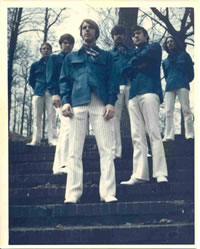 Me & Dem Guys
Me & Dem Guys
After the signing, Me & Dem Guys were sent to Chicago where they recorded four sides; “Yup”, “Mercy”, “Wail It”, and their first version of a Chubby Checker b-side from 1963 called “Black Cloud”. Columbia issued the songs on their Date Records subsidiary, but the singles failed to sell.
By 1965, the band decided to spread their wings beyond Southwest Michigan and go on the road to other areas around the state. This decision led the departure of both manager John Hopkins and guitarist “Daddy” Max Calhoun, who was married and holding down a full-time day job.
The band’s first road gig was scheduled at the Deer Hunt Inn located in Detroit, but they were forced to cancel because of a local ordinance that required entertainers to be twenty-one years of age. Luckily, the state musicians union decided to take up their case and challenged the ordinance in court. The case was decided in Me & Dem Guys’ favor, and the union actually helped get the band booked at the Cozy Lounge in Grand Rapids, Michigan.
Their successful appearance at the Cozy Lounge led to an incredible offer by the owners of another of the city’s nightclubs, the Elbow Room. Me & Dem Guys were booked in the club for an entire year. This is the booking that established the group as one of Grand Rapids’ most popular bands. Their shows commonly featured lines of people around the block waiting to see the band perform at the club.
In 1966, Me & Dem Guys traveled to Nashville for their second attempt at recording. They put down four songs on tape at the session; “Why Don’t They Understand”, “Gone, Gone, Gone”, a Jan Porter original called “Come On Little Sweetheart” and a second version of “Black Cloud”. The latter two songs were issued as a 45 rpm on Palmer Records. “Black Cloud” was beginning to make some noise nationally when their first version of the song was inexplicably released on Dearborn Records. The confusion over the two versions of the song on two different labels resulted in “Black Cloud” being pulled off the market.
In the fall of 1966, Me & Dem Guys started a lucrative long-term relationship with Tom Johnson and the Coral Gables Night Club chain. The agreement contracted the band to play in all the Coral Gables venues statewide including clubs in Saugatuck, East Lansing, Kalamazoo, and Detroit. Future band member Doug Cassens first saw Me & Dem Guys that year at the Coral Gables in East Lansing. Cassens recounted his impression of the band from 1966 in a recent email; “I couldn’t believe what a great vocal band it was. I stood in front of the speakers and listened to them play “In My Room” by the Beach Boys. I was just blown away”.
Doug Cassens would eventually join Me & Dem Guys in 1968 while he was attending Western Michigan University. The band had decided to bolster their sound by adding another horn player/vocalist, and brought Doug on board after he had sat in with the group at one of their jam sessions. Cassens was actually a music veteran who had formed his own band, the Don Douglas Quintet, and played in the Jackey Beavers Band. Beavers had previously teamed with Johnny Bristol as the recording duo of Johnny & Jackey on both Anna and Tri-Phi Records in Detroit. The pair is most famous for recording the original version of the Supremes’ hit “Someday We’ll Be Together” in 1961.
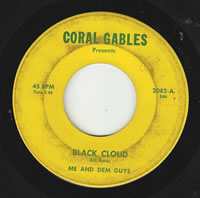
Prior to Cassens joining, Me & Dem guys recorded “Black Cloud” for a third time at the Great Lakes Recording Studio in Sparta, Michigan, in 1967. The session was produced by Tom Johnson who, for all intents and purposes, was also serving as the band's manager. The 45 rpm, again backed by “Come On Little Sweetheart”, was released on the Coral Gables label and sold and marketed through the chain of nightclubs.
1968 saw another important addition to Me & Dem Guys. Keith Seccombe grew up in London, England. His mother was an accomplished pianist, singer and dancer, and Keith studied music at the Trinity College of Music. Seccombe lived in London at an exciting time, and he was able to attend shows featuring musicians the caliber of John Mayall’s Bluesbreakers (including Eric Clapton on guitar) and Georgie Fame And The Blue Flames at venues like the Flamingo and the Marquee.
After moving to the United States in 1965, Keith started a band called the Dead End Kids with John McDonald, a co-worker in a music store in Rochester, New York. Seccombe met the members of Me & Dem Guys when the Dead End Kids were booked in Grand Rapids in 1966. After Keith’s band broke up in 1968, he was asked to join Me & Dem Guys as yet another vocalist/horn player.
With the new additions to the band, the sound of Me & Dem Guys began to change. The “frat rock” style of their early singles gradually gave way to a fuller sound highlighted by six vocalists and three horn players. At this important juncture, the band received a heavy blow when John Jennings decided to leave the group and get a more traditional job that would allow him more time with his wife and family.
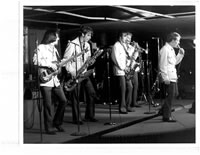
Me & Dem Guys then began specializing in medleys of material made famous by popular artists like the Moody Blues, Chicago, Sly & The Family Stone, the Beatles, and Three Dog Night. They continued to be a popular opening act for national acts appearing in the Grand Rapids area including the Box Tops, the Ides Of March, Bobby Sherman, and the Outsiders.
The band returned to the Great Lakes Recording Studio in Sparta in early 1969 to do some more recording. Not happy with the way the recording session was going, the band decided to move over to Midwestern Sound, a studio owned by Phil Roberts the guitarist of the Kingtones, one of Grand Rapids’ first rock and roll bands. The resulting 45 rpm was a cover of Traffic’s “Smiling Phases” backed with a cover of Cannonball Adderley’s instrumental “Mercy, Mercy”.
After failing to interest any of the major labels in the recording, the band decided to release the single on their own label, Pyrenees Records. Me & Dem guys used a do-it-yourself approach by marketing the single themselves through record stores and wholesalers, and promoting it on all radio stations in the Grand Rapids area. Their hard work was rewarded when “Smiling Phases” reached # 1 on Grand Rapids station WGRD’s Hot 30 in October of 1969.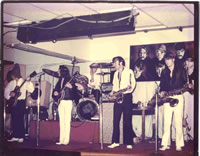 Me & Dem Guys on stage
Me & Dem Guys on stage
The follow-up single on Pyrenees in February of 1970 put the group’s dazzling vocal blend front and center. The a-side was a creative six-minute cover of the Jay & The Americans’ ballad “She Cried”. The flip was another group vocal workout titled “Gone, Gone, Gone”. The single was another solid regional hit making the Top 20 on several charts.
Me & Dem Guys released its third consecutive regional hit with a Keith Seccombe original titled “Simple Thoughts Of Love” backed by Jan Porter’s “Don’t Bug Me”. “Simple Thoughts Of Love” peaked at # 9 in August of 1970.
Following the success of the third Pyrenees single, Terry Kay was hired as an additional guitarist/ vocalist. Unfortunately, the band had been experiencing some smoldering creative and musical differences among its members even while they were achieving their greatest recording success. It came to a head when original member Frank Eimer left the group to pursue another musical direction near the end of 1970. Eimer was replaced by guitarist Donnie Rogers, who had formerly played with Doug Cassens in the Jackey Beavers Band and in the Don Douglas Quintet.
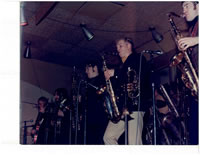
Me & Dem Guys received another major blow in 1971 when Keith Seccombe became seriously ill and blew out his vocal chords. Not knowing if his voice would return, Keith left the band and moved back to England. Seccombe’s departure was compounded when new arrival Terry Kay also left the group. But the crusher occurred when founding member and principal arranger Jan Porter decided to call it a day later the same year.
The remaining members added keyboardist George Voss from Kalamazoo and attempted to carry on as a five-piece. The band adopted a heavier musical style and recorded what would be their last single at a studio in Kalamazoo in 1972. The 45 rpm of “Mr. Elevator/Separation” failed to chart, and what was left of Me & Dem Guys called it quits in 1972.
Thirty-seven years later, Frank Eimer and John Jennings are back together and playing in the Frank Eimer Band, mostly in the West Michigan area. Lynn Riggs walked away from music after his experiences in Me & Dem Guys and has been employed in car sales for the past twenty-five years. Doug Cassens lives in Southfield, MI, and plays music on weekends in a premier wedding band. Donnie Rogers lives in St. Petersburg, FL, and plays an occasional jazz gig. Jan Porter just retired after years as a truck driver and lives in California. Keith Seccombe retired after 35 years in car sales, and is actively involved in church work in Grandville, MI. George Voss is still active in music playing on cruise ships in Japan. Sadly, original bassist Bobby Stiles died unexpectedly in 2009 from a brain injury, and Terry Kay passed away in Florida in 2011.
John Hopkins, the band's first manager, left the music business in the late 1960's for a successful career in the design and manufacture of spring-loaded seals for off-shore oil drilling. Hopkins died in Houston, Texas, in 2006.
In 2009, Me & Dem Guys were voted into Michigan Rock and Roll Legends Hall of Fame.
Dr J. Recommends:
“Who’s Me” – Although you can find some of Me & Dem Guys’ recordings on a variety of compilations, the best available picture of the band comes from this collection that was put together by Keith Seccombe. It has “Black 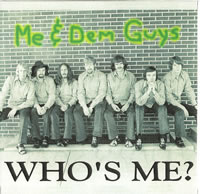 Cloud” and the three hits on Pyrenees: “Smiling Phases”, “She Cried”, “Simple Thoughts Of Love” along with their b-sides. Although it is an entertaining 17-song collection, I would have liked to have seen several of the early “frat rock” singles from 1964 – 1966 added to the CD in order to give a more balanced look at the band’s overall output.
Cloud” and the three hits on Pyrenees: “Smiling Phases”, “She Cried”, “Simple Thoughts Of Love” along with their b-sides. Although it is an entertaining 17-song collection, I would have liked to have seen several of the early “frat rock” singles from 1964 – 1966 added to the CD in order to give a more balanced look at the band’s overall output.

